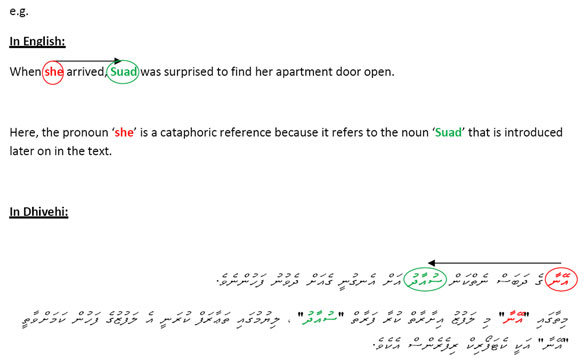As proposed by the philosopher Paul Grice, conversation is effective because speakers conform to the cooperative principle which he articulated as follows:
Make your conversational contributions such as is required, at the stage at which it occurs, by the accepted purpose or direction of the talk exchange in which you are engaged
This agreement of cooperation can be divided into four maxims or general principles according to the areas of communication they reflect:
– Maxim of Quantity
– Maxim of Relevance
– Maxim of Manner
– Maxim of Quality
Maxim of Quantity
Speakers are expected to provide as much information as is necessary for the interlocutors to understand their utterances and not to give more information that is necessary.
e.g.
If you ask a neighbour whether she has any children and she answered, ‘I have three sons’Â, it is the maxim of quantity that lets you assume she has no other children. You would take the utterance to imply that the neighbour has three (and only three) sons (and no other children)
What if she had three sons and two daughters?
What is she had four sons?
If she had other children, you would consider yourself deceived.
While her reply is not false as far as it goes, your (culturally defined) expectation that all information necessary to answer the question asked will be provided (without any parts of it being withheld or concealed) is violated.
Another example:
On your first day at work in a new school you meet a friend who used to study with you. You ask him what subject he is teaching and he replies:
When I fist joined here they asked me to teach Mathematics. Can you imagine? Me? Teaching math? When I asked for another subject the principal refused saying that what they needed most at the moment was a Math teacher and that I could find myself a job at another school if that didn’t suit me! I was quite put off by that, I tell you. But there wasn’t much I could do about it either; I mean, I needed the job, I have two children in schools and have to pay the rent too. So I agreed, albeit grudgingly. But just before start of term someone with a diploma in Math joined here. So I was asked to teach Social Studies instead. Man! That was a relief, I tell you. Since then I have been teaching Social Studies; but I am beginning to realize that I am not particularly keen on teaching this either. Perhaps English would be easier to teach? Maybe I should have a chat with the principal again? What do you think?
By providing too much information, far more than is required to answer the asked question, this person is as uncooperative as Fuad in the first example.
The maxim of quantity provides that, in normal circumstances, speakers say just enough (neither too much nor too little) to achieve the purpose of a particular communication – the aim is to be appropriately informative
Maxim of Relevance
According to this maxim, in normal circumstances, speakers need to be relevant at the time of the utterance.
e.g.
Gamaru: Who was that with you at the coffee shop?
Thakuru: They are going to set up a science lab there.
Taken literally, Thakuru’s utterance appears to be totally unrelated to what Gamaru said immediately before – thus it is a violation of the maxim of relevance.
It is due to expected conformation to this maxim that when someone produces an apparently irrelevant utterance listeners often try to understand the possible ways in which it might be relevant (e.g. as a joke, desire to change the subject …)
Maxim of Manner
This maxim can be summarized as – be orderly and clear.
According to this maxim speakers and writers should avoid ambiguity and be orderly in their utterances.
e.g.
Knead the dough well. Sift flour and salt together. Divide dough into several golf-ball sized pieces. Add the oil and hot water. Make a cup out of each dough ball. Deep fry over a medium flame. Fill with the prepared filling and close.
Why is this recipe odd?
Orderliness is necessary not only in the order of events; all languages also have rules that indicate how information should be organized within a piece of discourse.
e.g.
In most languages descriptions should be organized such that more specific details usually follow more generic information.
The country occupies an archipelago of about 322 islands, of which 106 are permanently inhabited. The name Fiji is the old Tongan word for the islands, which is in turn derived from the Fijian name Viti. In addition to these, there are some 522 islets. Fiji, officially the Republic of the Fiji Islands, is an island nation in the South Pacific Ocean. The two major islands, Viti Levu and Vanua Levu, account for some 87% of the total population. The country is to the east of Vanuatu, west of Tonga and south of Tuvalu.
Why does this passage seem difficult to follow?
Violations of the maxim of manner can create ambiguity and confusion.
e.g.
She went to Mulaku. She took five days’ leave.
Maxim of Quality
According to this maxim, speakers and writers ought to say only what they believe to be true and have evidence to prove what they say.
Although this maxim applies principally to assertions and certain other representatives only (expressives and directives cannot be judged to be either true or false) it is the most important maxim.
If the maxim of quality is not adhered to then the whether or not the other maxims are followed is irrelevant.
i.e. whether an utterance is too short or too long, relevant or not, ordered or not all lies are false.
Ironically, it is also the expectations that speakers and writers will abide by this maxim that makes lies possible.

